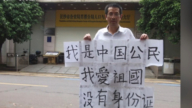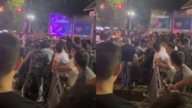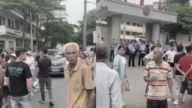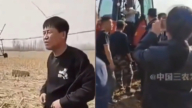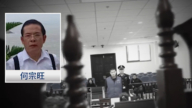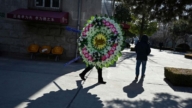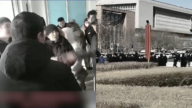【新唐人2013年03月13日訊】中國大陸持續發生地方官員私自租售村民的集體土地,中飽私囊等貪污腐敗問題。廣東省揭西縣上浦村自今年2月開始,村民因抗議村委會官員涉嫌腐敗,而發起集體示威,卻遭到當局暴力鎮壓。另一方面,官方媒體上,每天刊登中共領導人習近平有關「老虎蒼蠅一起打」的反腐口號,卻不見上浦村民被鎮壓的只字片語。
3月10號凌晨,廣東揭陽市揭西縣棉湖鎮政府出動上千名的武警、上百輛警車和強力吊車,突襲上浦村,先切斷全村電源,再施放大量催淚彈,防暴警察見人就打。事件造成約十輛車被燒燬,數十名村民受傷住院,其中多人重傷。
廣東政法委週日發出微博表示,已拘捕原村委負責人李寶玉等十人。正追捕涉嫌惡勢力頭目吳桂存等21人。原村委簽訂的土地承包合同已被揭西法院裁定撤銷﹔棉湖鎮委書記和鎮長被免職。
一位年輕村民對媒體說:10號當天防暴警察一句話都沒說,就開始發射催淚彈,並以棍棒毆打村民。村民們敲鑼示警,數百村民衝出去幫助遭毆打的人,但遭到約3000名安全人員逐退。
目前互聯網微博上輸入「上浦村」或「揭西縣」,都無法獲得任何搜索結果,顯示﹕上浦村反抗徵地又成為另一個被禁止議論的話題。
據了解,上浦村村民因不滿官商勾結賤賣村裡的近500畝田地,自今年2月22號開始,村民佔領村廣場示威,指稱當地官員出賣土地涉嫌腐敗,並要求選出新的村委會負責人。
2月24號,當地官員僱傭「黑社會人士」清場,但遭到抗議村民的反抗,現場一片混亂,有大約30輛車被砸。警方逮捕了多名抗議村民,並包圍了上浦村。村民則在村內設立路障,阻擋警察進入村內。雙方對峙了數週。
時政評論家藍述表示,現在中共北京的兩會還沒有完全結束,領導人口中信誓旦旦、響亮的反腐改革口號聲言猶在耳,但是廣東這邊卻出現了暴力鎮壓的維權事件。
時政評論家藍述:「村民的要求民主、要求懲治這些村官的貪污腐敗的行為,這東西本來村民的要求,是和中共第五代接班以後,在過去幾個月裡面所釋放出來的信息是非常一致的,可是呢,他們(中共)不但沒有按照以前的烏坎事件那樣進行處理,相反的是出現暴力鎮壓、暴力執法的事情,這是一個很讓人疑惑的信號。」
有媒體表示,胡春華主政廣東之後,各界都對這個中共第六代的明日之星寄予厚望,希望他能撥亂反正,在農村基層亂象中尋找出一條根本解決之道,但沒想到胡春華仍然以武力鎮壓為手段,與民意背道而馳。
時政評論家藍述:「這件事情它所釋放出來的信號,和前一段時間北京釋放出來的,所有的停止勞改制度,或者是要進行改革等等這一切信號,完完全全是背道而馳的,會讓外界對北京未來的走向,多打很多個問號,這個是非常令國際社會感到疑惑的一件事情。」
網友「廣州角落」說,村民對政府的行為很失望,村民難以忘記凌晨的暴行,村民忍著疼痛呼喊著,村民呻吟著。村民永遠記得2013年3月10日凌晨。
北京憲政學者陳永苗:「所以他說要改革,也是嘴巴說說,那改變不了它(中共)運轉的機制,例如地方財政需要依賴於這個徵地,搶奪農民的地,這一點是永遠不會變的。」
網友阿智說,看到那些血肉模糊的照片眼淚都快湧出來了。我愛我的祖國,但我討厭我們的政府!半夜三更一群人手拿盾牌和警棍,還扔催淚彈,掃蕩了整個村子,你們和當年鬼子進村有甚麼區別嗎?
採訪/劉惠 編輯/黃億美 後製/郭敬
Ordinary Citizens in China Protect Themselves
Local officials continue to profit from illegally, and privately
selling land collectively owned by villagers in China.
In February 2013, villagers from Shang Pu Village,
Guangdong Province, protested against suspected
corruption of village committee officials.
This led to a collective demonstration, but local
authorities quickly responded with a violent crackdown.
There was also a media silence over the incident.
However, official media did published reports on Xi Jinping’s
‘beating tigers and flies together’ anti-corruption slogans.
On March 10, the local government of Jieyang City,
Guangdong Province dispatched over a thousand
armed police, as well as hundreds of police cars
and powerful cranes, to attack Shang Pu Village.
They cut off the power supply to the village
first, and then threw many tear gas bombs.
Ten vehicles were burned, dozens of villagers were
hospitalized, with many of them seriously injured.
The former director of the village committee
disclosed that 21 people were hunted down.
This included leader Wu Guichung,
who maintained a microblog.
Land contracts signed by the former village
committee were revoked by Jiexi Court.
The Town Committee secretary and
the Mayor were removed from office.
A young villager told the media that on
March 10, riot police did not say a word.
They began to fire tear gas and beat villagers with clubs.
Villagers sounded a warning gong and
hundreds of them rushed out to help the victims.
They were chased away by 3,000 security guards.
Currently, one cannot find Shang Pu
Village or Jiexi City on Internet searches.
Shang Pu Village’s protests over illegal land
acquisition has become another forbidden topic.
It is reported villagers were unhappy about government
officials cheaply buying nearly 500 acres of land.
On February 22 2013, villagers occupied
the village square to demonstrate.
They accused local officials of corruption regarding the land
sales, and asked to elect a director of the village committee.
On February 24, local officials hired local thugs to clear
the village square, which met resistance from villagers.
About 30 police vehicles were damaged
and many villagers were arrested.
Meanwhile, villagers set up roadblocks
to block the police from entering.
The confrontation lasted for a few weeks.
Lan Shu, political commentator said that
the two sessions was not yet finished.
The leaders’ vows and slogans for
anti-corruption are still ringing in our ears.
In Guangdong, violent repression
of human rights has just arisen.
Lan Shu: “Villagers demanded democracy and
the punishment of local officials’ corruption.
Their requests were in accordance with
the messages from their new leaders.
However, the Chinese Communist Party
(CCP) reacted with violent suppression.
That is a puzzling signal for the Chinese people.”
Media reported that since Hu Chunhua ruled
Guangdong, people from all walks of life held
high hopes that he could bring order out of chaos.
In contrast to public opinion, he chose suppression by force.
Lan Shu: “This incident signals the opposite of previous
reforms, including calls for an end to forced labor camps.
Now, the international community is questioning the future
direction of Beijing, and are very puzzled by this incident.
One netizen said that illagers are very
disappointed with the local government.
They will not forget the atrocities of that
morning, and they endured the pain and cried.
Villagers will always remember
the morning of March 10, 2013.
Chen Yongmiao, Beijing constitutional scholar:
“They talked about reform, but words
alone cannot change the CCP system.
For example, the local government
revenue relies on land acquisition.
Thus, the robbing of land from
farmers will remain unchanged.”
Another netizen commented that seeing photos
of those bloody scenes, their tears almost ran down.
They said that they love their
country, but hate the government.
In the middle of the night, they held
shields and batons, and threw tear gas.
Were they any different from the Japanese
invading China during World War II?



